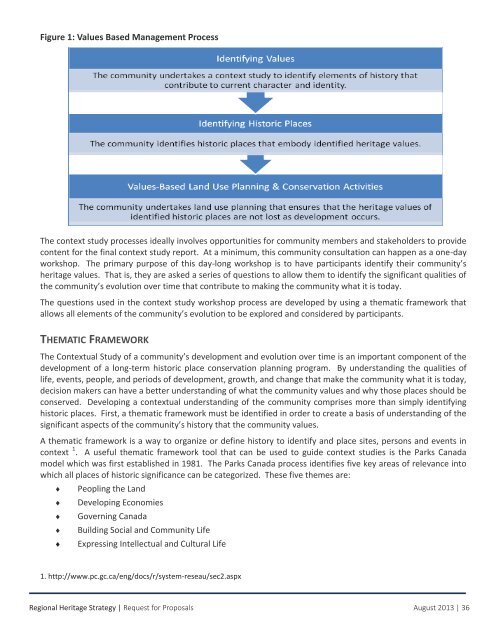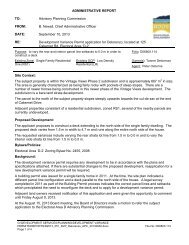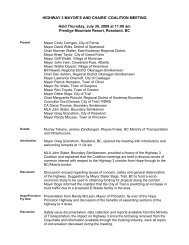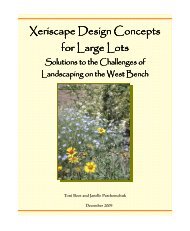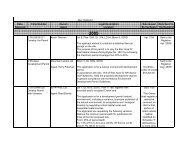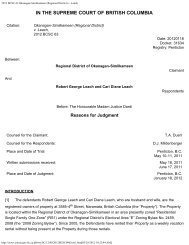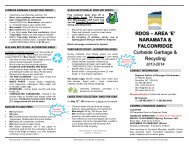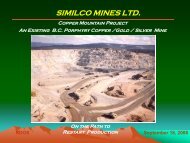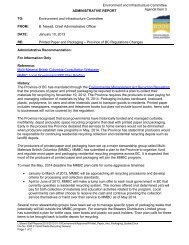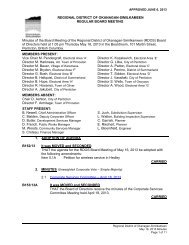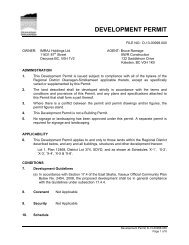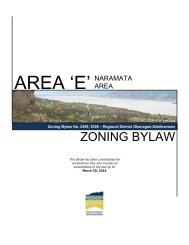Regional Heritage Strategic Plan 2013 - Rdosmaps.bc.ca
Regional Heritage Strategic Plan 2013 - Rdosmaps.bc.ca
Regional Heritage Strategic Plan 2013 - Rdosmaps.bc.ca
You also want an ePaper? Increase the reach of your titles
YUMPU automatically turns print PDFs into web optimized ePapers that Google loves.
Figure 1: Values Based Management Process<br />
The context study processes ideally involves opportunities for community members and stakeholders to provide<br />
content for the final context study report. At a minimum, this community consultation <strong>ca</strong>n happen as a one-day<br />
workshop. The primary purpose of this day-long workshop is to have participants identify their community’s<br />
heritage values. That is, they are asked a series of questions to allow them to identify the signifi<strong>ca</strong>nt qualities of<br />
the community’s evolution over time that contribute to making the community what it is today.<br />
The questions used in the context study workshop process are developed by using a thematic framework that<br />
allows all elements of the community’s evolution to be explored and considered by participants.<br />
THEMATIC FRAMEWORK<br />
The Contextual Study of a community’s development and evolution over time is an important component of the<br />
development of a long-term historic place conservation planning program. By understanding the qualities of<br />
life, events, people, and periods of development, growth, and change that make the community what it is today,<br />
decision makers <strong>ca</strong>n have a better understanding of what the community values and why those places should be<br />
conserved. Developing a contextual understanding of the community comprises more than simply identifying<br />
historic places. First, a thematic framework must be identified in order to create a basis of understanding of the<br />
signifi<strong>ca</strong>nt aspects of the community’s history that the community values.<br />
A thematic framework is a way to organize or define history to identify and place sites, persons and events in<br />
context 1 . A useful thematic framework tool that <strong>ca</strong>n be used to guide context studies is the Parks Canada<br />
model which was first established in 1981. The Parks Canada process identifies five key areas of relevance into<br />
which all places of historic signifi<strong>ca</strong>nce <strong>ca</strong>n be <strong>ca</strong>tegorized. These five themes are:<br />
Peopling the Land<br />
Developing Economies<br />
Governing Canada<br />
Building Social and Community Life<br />
Expressing Intellectual and Cultural Life<br />
1. http://www.pc.gc.<strong>ca</strong>/eng/docs/r/system-reseau/sec2.aspx<br />
inspire honour transform<br />
www.for.gov.<strong>bc</strong>.<strong>ca</strong>/heritage Page 2<br />
<strong>Regional</strong> <strong>Heritage</strong> Strategy | Request for Proposals August <strong>2013</strong> | 36


